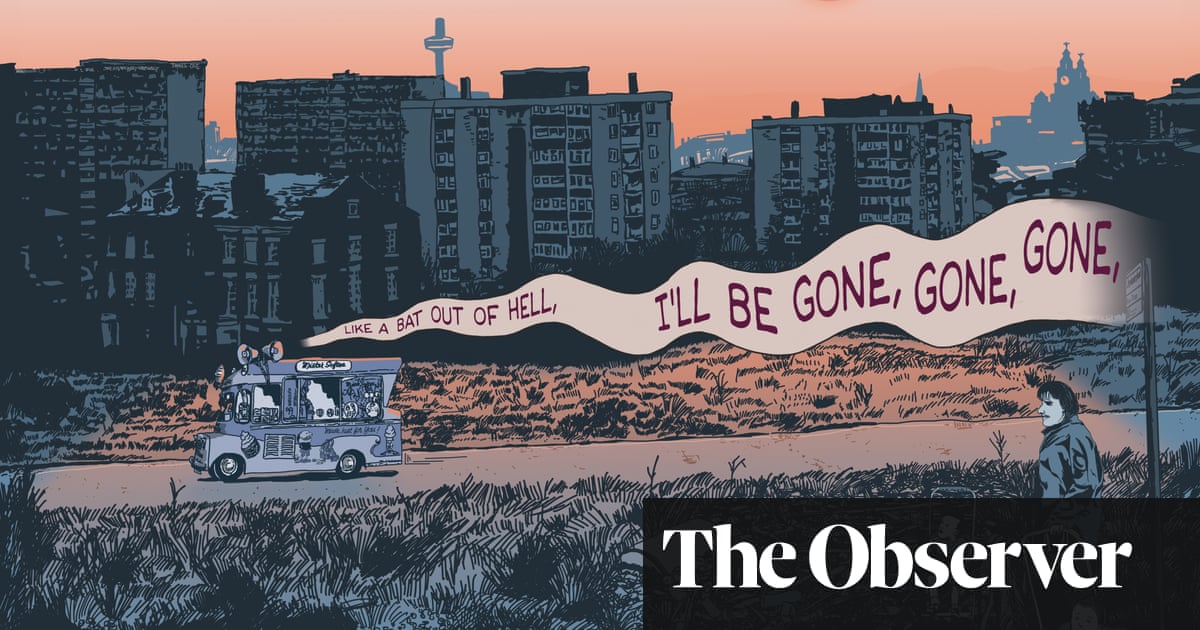I was drawn to this graphic novel by its Liverpool setting. A brief flick revealed colour-suffused images of landmarks that I’ve come to love thanks to my scouse husband: the curved iron and glass roof of Lime Street station; the twin clock towers of the Royal Liver Building; even the space-age crow’s nest that sits atop St Johns Beacon, AKA the Radio City Tower. Chris Shepherd, who drew and wrote Anfield Road, grew up in the city, and his affection for it, even in the bleakest of times, can be felt on every page. When he gives us a series of drawings of the magnificent but (at the time the book is set) sorely neglected St George’s Hall, the murmuration of starlings that rises above it eventually forms the shape of a heart.
In the end, though, it was Shepherd’s story that made me hang around. A bildungsroman set in the 1980s, it’s about a teenage boy called Conor who lives with his grandmother, Mary, in a terraced house in Anfield Road, home of Liverpool FC. For Conor’s peers, this is a dream address. When the art teacher at their comprehensive asks the class to draw their heroes, the boys all sketch the Liverpool striker Ian Rush, the picture copied from the cover of Look-in magazine. But Conor has never even been to a match. His dreams are of London, where he hopes to attend art college, and by doing so escape his dysfunctional family. Mary is a drinker who’s always broke. His mother lives elsewhere, having run off with a waiter she met in an Indian restaurant (Mary did not approve). Conor’s father, the kind of scally who thinks nothing of pinching a stray ice-cream van when his Cortina breaks down (“I fancied a 99”), disappeared long ago – though to Mary’s horror he’s about to reappear, just in time for his son’s 18th birthday.
In his first book, Shepherd, a Bafta-nominated director and writer, steps into difficult territory with a confidence that brings to mind Paul Abbott’s TV series Shameless. This comic is full of sadness. Conor’s parents cannot help him, even when the domineering Mary is diagnosed with cancer, her illness threatening to keep him in Liverpool after all. After the Hillsborough disaster, the street outside their house is so full of people taking flowers to Anfield, the ambulance that brings her home from hospital cannot reach their front door. But it’s also zany and joyful. Even amid such chaos, poverty and prejudice, people are always cracking jokes, while Shepherd knows just the right moment to deploy his taste for bathos.
When Conor at last makes it to his first Liverpool game, he’s concerned for the little old man who’s next to him in the stands. “Do you think he’ll be all right?” he asks his dad, Danny, who can’t understand why Conor’s making such a fuss. As Liverpool go two down, however, the old man is transformed. He’s swearing like a sailor, each expletive louder and ruder than the one before. Not long after this, Danny grandly, and rather unexpectedly, offers to drive Conor and his girlfriend, Maureen, to Lime Street to catch a train to London. Their taxi is an ice-cream van with pimped chimes, and the soundtrack to their departure (“I’ll be gone, gone, gone”) Meatloaf’s Bat Out of Hell.
